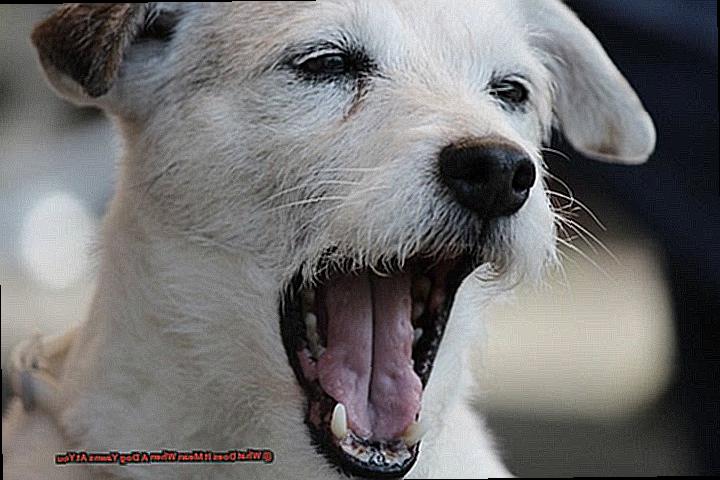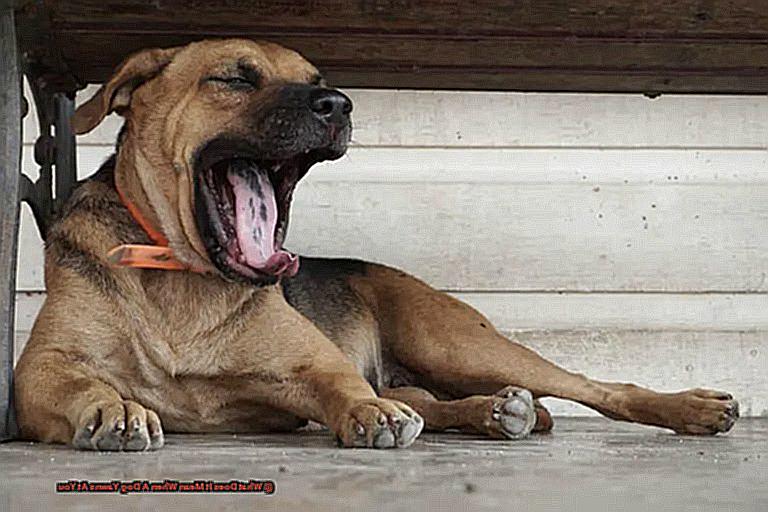What Does It Mean When A Dog Yawns At You?
Have you ever caught your furry companion mid-yawn, with those big, soulful eyes gazing up at you?
It’s a common behavior that we often overlook, but there’s more to a dog’s yawn than meets the eye. As pet owners, we’re always trying to understand our canine companions and their needs.
So why do dogs yawn at humans? Is it just a sign of sleepiness or could there be a deeper meaning behind it?
Get ready to discover something new about your four-legged pal.
What Does It Mean When A Dog Yawns At You?
Contents
- 1 What Does It Mean When A Dog Yawns At You?
- 2 The Different Meanings of a Dog Yawning at You
- 3 Yawning as a Sign of Relaxation or Boredom
- 4 Yawning During Training or Commands: Frustration or Confusion?
- 5 Communicating Through Yawning: Anxiety and Discomfort
- 6 Affectionate Yawns: What Your Dog Might Be Trying to Say
- 7 When to be Concerned: Constant Yawning and Underlying Health Issues
- 8 Conclusion
While yawning in dogs is a common behavior, it can have different meanings depending on the context and other body language cues. As an expert on dogs, I am here to explain the reasons behind why dogs yawn and how it can be a form of communication.
Why Do Dogs Yawn?
Similar to humans, dogs may yawn due to various reasons such as fatigue, stress, or boredom. Yawning is a natural behavior that allows the body to take in more oxygen and release tension. However, when a dog yawns at their owner, it can have a deeper meaning.
Forms of Communication
Dogs use body language as a way to communicate their emotions and needs. Yawning is one of those signals and can signify different intentions. Let’s take a closer look at some possible interpretations of a dog yawning at their owner.
Affection and Comfort

One possible reason for a dog yawning at their owner is to show affection. Just like humans may yawn when feeling relaxed and content, dogs may also yawn as a way to show their love and comfort towards their owners. So next time your Frenchie yawns at you while cuddling on the couch, it could be their way of saying “I love you.”
Calming Down in Stressful Situations
Another explanation could be that the dog is trying to calm themselves down in an anxious or stressful situation. Yawning can be a self-soothing behavior for dogs, and they may do it when feeling overwhelmed or unsure. If your dog yawns while avoiding eye contact or turning their head away from you, it could mean they are feeling stressed and trying to calm themselves down.
Communication of Needs
Dogs may also yawn as a way to communicate their needs or desires. If your dog yawns while looking at their food bowl, it could mean they are hungry. If they yawn while staring at the door, it could mean they want to go for a walk or outside. Paying attention to the context in which your dog yawns can help you better understand their needs.
The Different Meanings of a Dog Yawning at You
As a proud French Bulldog owner, you know that these adorable pups have a unique way of communicating with their humans. They may bark, wag their tails, or even give you those irresistible puppy-dog eyes. But have you ever wondered why your furry friend yawns at you? Is it a sign of tiredness or could there be something more to it?
Well, get ready to unravel the mystery because as an expert on dog behavior, I’m here to decode the different meanings behind your French Bulldog’s yawns.
Signs of Anxiety and Stress
Contrary to popular belief, yawning in dogs is not always a sign of tiredness. In fact, one possible meaning of a dog yawning at you is that they are feeling anxious or stressed. This could be due to unfamiliar surroundings, loud noises, or an overwhelming amount of people or other animals. Yawning can be a canine’s way of releasing tension and calming themselves down.
Communication with Humans and Other Dogs
Another reason for a dog yawning could be as a form of communication. Dogs may yawn to show submission or appeasement towards another dog or human. It can also be a way for them to communicate that they are not a threat and are trying to avoid confrontation. So if your French Bulldog yawns when interacting with you, it could be their way of saying “I mean no harm.”
Discomfort and Pain
Yawning can also signal discomfort or pain in dogs. If your French Bulldog yawns frequently when interacting with you, it could be a sign that they are experiencing discomfort or pain in their body. This could be due to an injury or underlying health issue. It is essential to observe your dog’s body language and consult a veterinarian if you notice any other concerning behaviors.
Mirroring Behavior
Lastly, dogs may also yawn as a way of mirroring their owner’s behavior. As the saying goes, “yawns are contagious,” and this rings true even for our furry friends. If a human yawns, it can trigger a dog to yawn as well, even if they are not tired. This behavior is often seen in puppies who learn from their owners’ actions.
Yawning as a Sign of Relaxation or Boredom
In this section, we’ll dive deeper into the topic of yawning as a form of communication and social bonding between dogs and humans. So, the next time your Frenchie yawns at you, you’ll know what they’re trying to say.
Yawning as a Sign of Relaxation or Boredom

Like humans, dogs also yawn when they are feeling relaxed and at ease. This behavior can often be observed after a long walk or play session, as they release built-up tension and relax their muscles. It’s their way of telling us that they are calm and content.
On the other hand, yawning can also be a sign of boredom in dogs. When they are not mentally or physically stimulated enough, they may yawn as a way to cope with the lack of stimulation. This is especially common in breeds like French Bulldogs, who have higher energy levels.
Paying Attention to Context
As responsible dog owners, it’s important to pay attention to the context in which our dogs yawn. If they are yawning after a long walk or playtime, it is likely a sign of relaxation. However, if they are yawning excessively or in situations where they should be engaged and active, it could be a sign of boredom or even stress.
Yawning as a Form of Communication
In some cases, dogs may yawn as a way to communicate with humans. They may yawn when they want attention or when they feel uncomfortable in a certain situation. For example, if your Frenchie is feeling overwhelmed by too much attention from unfamiliar people, they may yawn to signal that they need some space.
Contagious Yawning and Social Bonding
Research has shown that dogs are more likely to yawn when their owners yawn compared to when strangers yawn. This suggests that dogs have developed social bonding with humans and use yawning as a way to communicate and connect with us. So, the next time your Frenchie yawns after you do, know that it’s their way of showing they are in tune with you.
Understanding Your Dog’s Needs
Yawning During Training or Commands: Frustration or Confusion?
As an expert on the topic, I’m here to help you understand why your Frenchie may be yawning during training or commands.
Differentiating Between Regular Yawns and Training Yawns
First and foremost, it’s important to differentiate between regular yawns and yawns during training. While regular yawns may just signify tiredness or relaxation, yawns during training can have a deeper meaning. Dogs use body language to communicate, and yawning during training can be a way for them to express their frustration or confusion.
Signs of Frustration or Confusion
So how do we know if our dog’s yawn is a sign of frustration or confusion? Pay attention to their body language. Are they tensing up, lip licking, or avoiding eye contact? These are all signs that your dog may be feeling overwhelmed or unsure about what is being asked of them. If your dog consistently yawns during training, it may be time to take a break and reassess the training approach.
Why Do Dogs Yawn During Training?
There are a few reasons why dogs may yawn during training. One common reason is that they are not understanding what is being asked of them. This could be due to unclear commands or too much information being given at once. Another reason could be that the training session is taking too long, and your dog is getting frustrated or bored. In some cases, yawning during training can also be a sign of stress or anxiety in dogs.
Tips to Reduce Frustration and Confusion
As a responsible dog owner, it’s important to create a calm and safe environment for your dog during training. Positive reinforcement techniques and keeping training sessions short and engaging can also help reduce frustration and confusion. If the yawning behavior persists, it may be beneficial to consult with a professional dog trainer who can help address any underlying issues causing the behavior.
Communicating Through Yawning: Anxiety and Discomfort
While it may seem like a simple reflex, there could be more to these yawns than meets the eye. As an expert on “Communicating Through Yawning: Anxiety and Discomfort,” I am here to explain the reasons behind why dogs yawn and how it can be a form of communication for anxiety and discomfort.
Why Do Dogs Yawn?
Before we dive into the significance of yawning as a form of communication, let’s first understand why dogs yawn in general. Just like humans, dogs can yawn for a variety of reasons such as tiredness, boredom, or even just to stretch their jaw muscles. However, one common cause of yawning in dogs is anxiety or discomfort.
Yawning as a Form of Communication
When your French Bulldog yawns at you, it could be their way of communicating that they are feeling stressed, anxious, or uncomfortable. This can be especially true for Frenchies, who are known to have separation anxiety and can become easily stressed in unfamiliar situations. It’s important to pay attention to the context in which your dog yawns. If they yawn when being approached by a stranger or in a new environment, it could indicate that they are feeling uncomfortable and may need some extra reassurance and comfort from you.
Yawning can also be a sign of discomfort or pain in dogs. If your Frenchie yawns frequently, it could be a red flag that they are experiencing physical discomfort, such as joint pain or an upset stomach. In this case, it’s important to consult with a veterinarian to rule out any underlying medical issues.
Calming Signals
Yawning can also be a calming signal in dogs, used to diffuse tense situations or communicate that they are not a threat. If your dog yawns when meeting another dog or person, it could be a way of saying “I’m not a threat” or “Let’s keep things calm and peaceful.” This is especially important to keep in mind when introducing your Frenchie to new people and dogs.
Affectionate Yawns: What Your Dog Might Be Trying to Say
Have you ever wondered what your dog might be trying to say with these affectionate yawns?
Yawning is a natural behavior in dogs, and it can be triggered by various emotions such as excitement, stress, and relaxation. However, when your dog yawns at you, it could be a sign of something more meaningful – love and affection.
So why do dogs yawn, and how can it strengthen the bond between you and your Frenchie? Let’s dive into the fascinating world of affectionate yawns and uncover their hidden meanings.
A Sign of Trust and Comfort
When your dog yawns at you, it could be a sign of trust and comfort. Your furry friend may feel relaxed and content in your presence, and the yawn is a way for them to show it. It’s their way of saying “I feel safe with you” or “I love being around you.”
Bonding Between Dogs and Humans
Yawning can also be a form of bonding between dogs and humans. It is a way for them to establish a connection and build a stronger relationship. So next time your Frenchie gives you an affectionate yawn, take it as an opportunity to strengthen your bond with them by giving them some extra love and attention in return.
A Calming Signal
Some experts believe that dogs may also yawn as a way to calm themselves down when feeling overwhelmed or anxious. So if your dog yawns at you in a stressful situation, it could be their way of seeking comfort from you. Pay attention to their body language and other cues to determine if they need some extra support during these moments.
Contagious Yawning
Did you know that yawning can be contagious between dogs and humans, just like it is between humans? This further supports the idea that it is a form of communication and bonding between dogs and their owners. So if you yawn back at your Frenchie, it could be a way for you to connect with them on a deeper level.
When to be Concerned: Constant Yawning and Underlying Health Issues
While occasional yawning is normal for dogs, constant yawning in specific situations could be a red flag for underlying health issues. As a responsible pet owner, it’s essential to pay attention to your dog’s behavior and know when to be concerned. In this post, we’ll dive into potential health issues that may cause constant yawning in dogs and how keeping a journal of yawning episodes can aid in proper diagnosis and treatment.
First and foremost, it’s important to understand that just like humans, dogs yawn for various reasons. It could be a way to release tension, boredom, or even as a way to cope with discomfort. However, when a dog yawns excessively and in specific situations, it could be a sign of an underlying health issue.
One common cause of constant yawning in dogs is respiratory problems. Dogs with allergies or respiratory infections may yawn more frequently as a way to open up their airways and get more oxygen. If you notice your dog struggling to breathe or wheezing, it’s best to consult with your veterinarian for proper treatment.
Pain or discomfort is another possible reason for constant yawning. Dogs who are in pain may yawn as a way to cope with the discomfort, especially for older dogs who may be experiencing joint pain or other age-related health problems. It’s important to observe your dog’s behavior and look for other signs of pain, such as limping or reluctance to move.
The timing of the yawning can also provide valuable information about the underlying issue. If your dog yawns before or during a specific activity, such as going for a walk or playing, it could be a sign of anxiety or stress. Separation anxiety is a common issue that can cause dogs to yawn excessively when they are separated from their owners.
Other potential health issues that could cause constant yawning include neurological disorders, dental problems, and even certain medications. If you notice your dog yawning excessively and cannot determine the reason behind it, it’s best to consult with your veterinarian for a proper diagnosis.
It’s essential to keep in mind that constant yawning alone does not necessarily mean your dog has a health issue. It’s crucial to observe other behaviors and look for additional symptoms before jumping to conclusions. Yawning should be viewed as one piece of the puzzle and not the sole indicator of a problem.
Also Read: Can Dogs Eat Nectarines Without The Pit
Conclusion
In conclusion, yawning is a common and often overlooked behavior in dogs. As pet owners, it is crucial to pay attention to our furry companions and understand their communication methods. When a dog yawns at their owner, it can convey various meanings depending on the context and other body language cues.
Yawning can be a form of affection, comfort, stress relief, boredom, or even pain for dogs. It is also a way for them to build trust and bond with their owners. Furthermore, consistent yawning in specific situations could indicate underlying health issues that require prompt attention from a veterinarian.
As responsible pet owners, it is our responsibility to strive towards better understanding our canine friends and their behaviors. By doing so, we can strengthen our bond with them and ensure their overall well-being.




